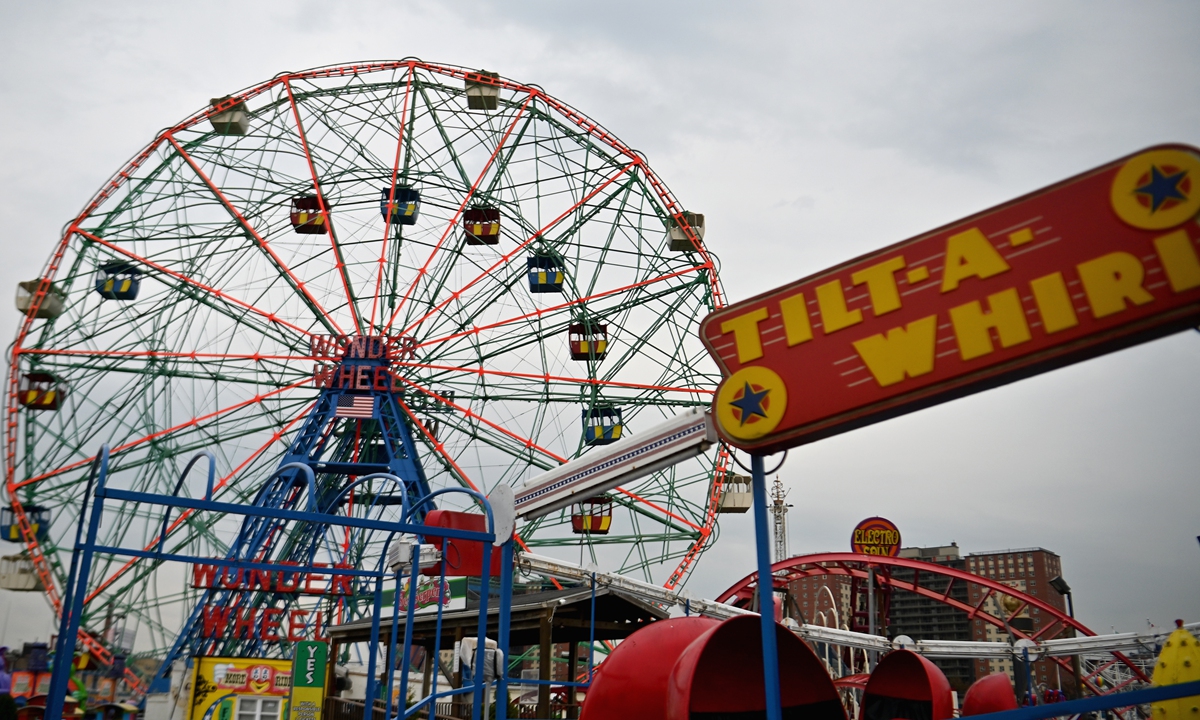Virus imperils ‘people’s playground’ of New York
Source: AFP Published: 2020/8/27 18:58:41

The Wonder Wheel at Coney Island, New York City on August 13 Photo: AFP
Summers in Coney Island usually ring with the sound of excited screams from roller coasters, playful shouts from bumper cars and children's laughter from spinning teacups.
But the coronavirus pandemic has silenced the famous New York boardwalk, causing one of the most difficult periods in its 150-year history and sparking fears for its future.
"It's horrible, it's depressing," said Dennis Vourderis, sitting amid the shuttered rides of Deno's Wonder Wheel Amusement Park, which he co-owns with his brother.
2020 was supposed to be a big year for Deno's, with the park celebrating the 100th anniversary of its best-known attraction - the 45-meter-high Wonder Wheel.
But the COVID-19 lockdown and the absence of foreign tourists have made this the first summer since its opening in 1920 that the Ferris wheel hasn't turned, ending a run that survived even World War II.
The Vourderis brothers have had to put on hold an expansion plan after they spent $12 million on adjacent land and a new ride.
"Normally, our revenues are several million dollars. This year it's zero. We've had some sleepless nights for sure," Vourderis, 61, told AFP.
Nearby on the boardwalk - on the southwestern tip of Brooklyn - is Ruby's Bar and Grill, a restaurant that has served holidaymakers since 1934.
"Our business is off 75 percent from what it would normally be," said owner Michael Sarrel.
"We won't be able to make enough money to pay the rent this season. In fact we've given some strong consideration to possibly selling the business," he added.
Coney Island first became an amusement district in the 1880s; New Yorkers sometimes call it "the people's playground."
In a normal year, around 7 million people flock to its beach and boardwalk, taking a twirl on its cheap, old-fashioned fairground rides or snacking on fluffy pink cotton candy.
After suffering years of neglect and decline between the 1970s and 1990s, Coney Island has been revitalized since the turn of the century.
But the cleanup has also sparked a fight for the soul of the quirky area, with several small family-owned businesses disappearing as high-end chains move in.
A New York City spokesman told AFP the government was "working with partners" in Coney Island on ways to "maintain its charm."
But businesses say they haven't received enough help to survive the coronavirus.
Government payroll protection loans barely covered a few weeks of expenses, Alexandra Silversmith, executive director of the Alliance for Coney Island, told AFP.
Coney Island has survived crises in the past, most notably Superstorm Sandy in 2012, which gutted shops and destroyed rides, covering them in sand.
But amusement park owners say coronavirus has been more difficult, with the financial devastation compounded by the psychological trauma of not knowing when businesses will be allowed to reopen.
They fear coronavirus will wipe out their whole April-to-October season.
Other sectors of New York, where COVID-19 has killed 23,000 people, have reopened as the city works to bring the virus under control.
But maintaining social distance on a roller coaster or a teacup ride is difficult.
Newspaper headline: End of the ride?
Posted in: ART,CULTURE & LEISURE